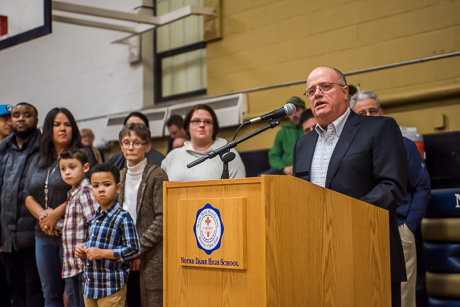County committee gives nod to city's economic development proposals
A plan hatched by the City, the Batavia Development Corp. and the Genesee County Economic Development Center to redirect some money generated by economic development into brownfield area cleanup received the support Wednesday of the county's Ways and Means Committee.
The committee approval means the proposal will be voted on by the full County Legislature at its next meeting.
The plan, unique in the state, called Batavia Pathway to Prosperity, will create a fund from PILOT (payment in lieu of taxes) payments that can be used for environmental clean up on properties within the city's brownfield opportunity area, a 366-acre designation covering the city's core.
A PILOT provides a business undertaking local economic development (creating jobs, increasing the tax base, adding to local economic growth) with a break in taxes for the increase in assessed value on the property being developed. Typically, if a business puts a new building on vacant land or adds onto an existing building, the assessed value of the property will increase, which means higher property taxes paid to the city (town or village), school district and county. A PILOT reduces those taxes in exchange for payments to the taxing jurisdictions. The payments could be in the range of 70 percent of what the increase in taxes would have been without the PILOT. The property owner still pays 100 percent of the taxes on the original assessed value. PILOTs typically run for 10 years on a graduated scale, with property taxes due increasing every two years over the life of the PILOT.
The new program would redirect half of the PILOT payments from projects in the city to an investment fund (a PIF) that would be available to property owners in the future who wish to redevelopment brownfield properties and need assistance with the environmental cleanup.
"This creates a fund that gives the BDC and the EDC working together and providing collective oversight the opportunity to look at broad range investment opportunities," said Steve Hyde, CEO of the GCEDC. "(The projects) still have to be for the public good, but (the property owner) can turn around and maybe do some creative financing type of things to really move some property and get them redeveloped and start to heal the poverty and blight down in our core."
Marianne Clattenberg, now a legislator but a former City Council president, said the city has needed something like this for a long time, but had other problems to solve first before something forward-looking could be brought to the table.
"We knew going in we could never do this by ourselves, that we needed partners and we needed to have everybody on board and engaged to bring the city back to where it needs to be," Clattenberg said.
County Manager Jay Gsell said a program like this could spark a renaissance in the city.
"The need is unique and this is the kind of structural financing that gives the adroitness necessary to having this kind of money available," Gsell said.
The committee also approved a city plan to provide tax relief on so-called zombie properties. The program would provide a PILOT-like tax abatement on the increase in assessed value of a home that is currently vacant and has been vacant for some time that a person buys, renovates and then lives in. While the abatement isn't available to an investor who buys a zombie house, fixes it up and then rents it out, the abatement could be available to the next owner if that same investor fixes it up and then sells it to an owner-occupant.
There are 50 to 60 such zombie properties in the city, not all of which can be saved, but some retain some value and could be renovated. The property must be single family, or converted to a single-family residence.
Hyde said the two programs together are the sort of thing that can spur economic development in the city's core and attract the Millennials who will be taking jobs at STAMP (Alabama's Science and Technology Manufacturing Park) to the city.









